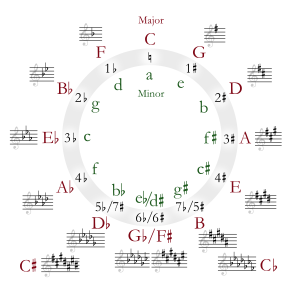G major
 | |
| Relative key | E minor |
|---|---|
| Parallel key | G minor |
| Dominant key | D major |
| Subdominant | C major |
| Component pitches | |
| G, A, B, C, D, E, F♯ | |
G major (or the key of G) is a major scale based on G, with the pitches G, A, B, C, D, E, and F♯. Its key signature has one sharp, F♯. Its relative minor is E minor and its parallel minor is G minor.
The G major scale is:
For orchestral works in G major, the timpani are typically set to G and D, a fifth apart, rather than a fourth apart as for most other keys.[citation needed]
Notable compositions
Baroque period
In Baroque music, G major was regarded as the "key of benediction".[1]
Of Domenico Scarlatti's 555 keyboard sonatas, G major is the home key for 69, or about 12.4%, sonatas.
In the music of Johann Sebastian Bach, "G major is often a key of 6
8 chain rhythms", according to Alfred Einstein,[2] although Bach also used the key for some 4
4-based works, including his third and fourth Brandenburg Concertos. Pianist Jeremy Denk observes that the Goldberg Variations are 80 minutes in G major.[3]
Classical era
Twelve of Joseph Haydn's 106 symphonies are in G major. Likewise, one of Haydn's most famous piano trios, No. 39 (with the Gypsy Rondo), and one of his last two complete published string quartets (Op. 77, No. 1), are in G major.
In addition, G major is the home key of Mozart's Eine kleine Nachtmusik, serving as the tonic for three of its four movements (the exception being the second movement, titled Romanze which is in the subdominant key). However, almost none of his large-scale works such as his symphonies or concertos are in this key; exceptions are the Piano Concerto No. 17, Flute Concerto No. 1 and his String Quartet No. 14, along with some examples among his juvenilia.
In popular culture
G major is the key stipulated by Queen Elizabeth II to be used for "God Save the Queen" in Canada.[4] The anthem "God Defend New Zealand" ("Aotearoa") was originally composed by John Joseph Woods in A♭ major, but after becoming New Zealand's national anthem in 1977 was rearranged into G major to better suit general and massed singing.[5] According to Spotify, G major is the most common key of music on the streaming service (closely followed by C major). [6]
See also
References
- ^ Mellers, Wilfred (8 April 1991), "Modernism's Child", The New Republic, 204 (14): 38–40
- ^ Alfred Einstein, Mozart, His Character, His Work, Chapter 10, "Mozart's Choice Of Keys"
- ^ Why I hate the Goldberg Variations
- ^ Department of National Defence: The Honours, Flags and Heritage Structure of the Canadian Forces; p. 7–2, point 10. Archived March 25, 2009, at the Wayback Machine
- ^ "Musical score for God Defend New Zealand". Ministry of Culture and Heritage / Manatū Taonga. Retrieved 10 May 2016.
- ^ Buskirk, Eliot Van (2015-05-06). "The Most Popular Keys of All Music on Spotify". Insights. Retrieved 2019-01-14.
External links
 Media related to G major at Wikimedia Commons
Media related to G major at Wikimedia Commons


